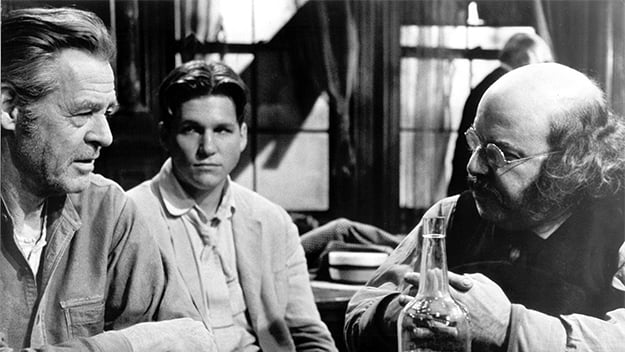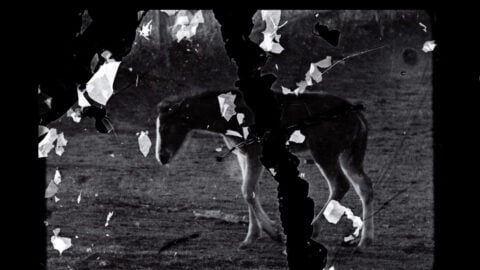Jeff Bridges: The Wanderer
This article appeared in the April 26, 2024 edition of The Film Comment Letter, our free weekly newsletter featuring original film criticism and writing. Sign up for the Letter here. For more on the 49th Chaplin Award, visit Film at Lincoln Center.

The Iceman Cometh (John Frankenheimer, 1973) © The American Film Theatre
It sounds absurd, but it’s true: in the early 1970s, right as his career seemed to be taking off, Jeff Bridges came very close to quitting acting altogether. He’d been nominated for an Academy Award for his performance in Peter Bogdanovich’s 1971 classic The Last Picture Show, and followed that up with his turn as a fledgling boxer in John Huston’s acclaimed 1972 drama Fat City. That same year, he’d starred in Robert Benton’s cult western Bad Company, memorably playing the boastful head of a youthful gang of thieves. By all accounts, Bridges was on his way—a talented young man destined for real stardom. And yet, for some reason, he was prepared to give it all up and walk away.
Bridges had other ambitions: he wanted to make music, and create art. (In subsequent years, he would continue to do both.) More than anything, though, he felt conflicted about having entered the family business. Besides his parents, Dorothy and Lloyd Bridges, his older brother Beau was also an actor, as was his sister Cindy. In interviews, he often expressed remorse over the fact that his family connections and name had helped him get parts.
Then Bridges was cast in the American Film Theatre production of Eugene O’Neill’s The Iceman Cometh (1973). “You gotta do this, Jeff, it’s class,” his agent had implored him. Directed by John Frankenheimer, this was basically a staging of O’Neill’s sprawling multicharacter chamber drama for the cameras, halfway between a theater piece and a movie. Playing the part of a guilt-ridden stool pigeon, Bridges got to act alongside legends like Lee Marvin, Robert Ryan, and Fredric March. These were “guys I was maybe a little intimidated by, guys I admired,” Bridges would tell Rolling Stone in 1977. “After that, I was pretty much committed to acting.”
But he didn’t want things to be easy anymore. Bridges had seen how his father, whom he admired greatly, kept getting offers to do more scuba-diving roles after the success of his hit syndicated TV series Sea Hunt. Lloyd Bridges had been a victim of the Hollywood blacklist for a time, and the show had helped resurrect his career—but it also led to him being offered the same types of parts over and over again. Jeff didn’t want to get similarly pigeonholed. He made a point of taking on a broad range of projects. He wanted, in his own words, “to not give the audience too strong a persona.”
Then a funny thing happened: Jeff Bridges found his persona.
There is sometimes a schizophrenic quality to stardom. You can act as hard and as well as you want, but audiences will gravitate to you for reasons largely beyond your control. When Bridges first approached Peter Bogdanovich for The Last Picture Show, he was interested in the role of Sonny, the film’s sensitive protagonist eventually played by Timothy Bottoms. But Bogdanovich cast Bridges as Duane, Sonny’s callow, directionless best friend. The director saw the character of Duane as a bit of a jerk, but he needed someone attractive and likable in the part, to land his broader humanist point that all the film’s characters were fundamentally helpless products of their milieu.
From the start, there was always something likable about Bridges. With those pleading eyebrows and that broad smile, he has a face that hovers between bafflement and acceptance, which is probably an attitude more relatable to the average viewer than the brooding turmoil of so many leading men of his generation. He moves with ease, but we can sense a halting indecision behind the eyes. Many of Bridges’s best films mine this tension, and part of his appeal as a movie star over the last 50-plus years is rooted in familiarity and openness. When we watch Jeff Bridges, we see, and understand, ourselves a little better.
In Lamont Johnson’s sports biopic–cum–character study The Last American Hero, released the same year as The Iceman Cometh, Bridges plays Junior Jackson, a young driver who gets on the stock-car racing circuit to make money after his moonshiner dad winds up in prison. “Sometimes, just on his own, Jeff Bridges is enough to make a picture worth seeing,” Pauline Kael wrote, famously praising the film for The New Yorker. “He’s the most American—the loosest—of all the young actors, unencumbered by stage diction and the stiff, emasculated poses of most juveniles. If he has a profile, we’re not aware of it.” For Kael, this lack of profile meant that Bridges brought a certain lived-in authenticity to his parts: “Jeff Bridges just moves into a role and lives in it.”
In some ways, Bridges has been a man out of time since the dawn of his career. He was one of the great stars of the 1970s, but he never landed one of the decade’s iconic roles: there’s no Travis Bickle, no Michael Corleone, no Frank Serpico, nor even a Butch or a Sundance in his early filmography. But he had himself. In an era when so many young American performers had been forged in the fiery furnaces of the Actors Studio and experimental New York theater, Bridges seemed free of the intensity and hunger of others in his generation.
One of Bridges’s first starring roles came in a 1971 TV movie, In Search of America, about a restless young man who converts a school bus into a caravan and packs his whole family in to go see the country. If pictures like Easy Rider (1969) had presented audiences with a kind of druggie, drifting-outlaw ideal—one they most likely never would aspire to themselves—In Search of America offered them the American wanderer as an ordinary person, the boy next door—namely Bridges.
Maybe that’s why the actor is associated so closely with the western, a genre that’s been on life support for pretty much his entire career. Even when he wasn’t making westerns, he kind of was making westerns. A young Jeff Bridges wouldn’t have been anyone’s first choice for a roughneck cowboy, necessarily—he seemed too sincere, too laid-back for that. Nevertheless, he makes a fine tenderfoot in Howard Zieff’s Hearts of the West (1975), in which he plays an impressionable young man who goes off to cowboy college, discovers the school is a sham, and falls in with a group of Hollywood stuntmen instead. In Michael Cimino’s 1974 car-centric thriller Thunderbolt and Lightfoot (which won Bridges his second Oscar nomination), he’s an impulsive, eager small-time thief to Clint Eastwood’s cynical, autocannon-wielding career criminal. The chemistry between the steely Eastwood and the loose-limbed up-and-comer as they tear through the dirt roads of Montana rivals that of any other 1970s western duo.
In interviews around this time, Bridges would talk about the role fear played in his life and his career, a surprising admission from an actor supposedly known for his surfer-boy placidity. Look closer at all of the performances from this era and you’ll sense a hesitation in these characters, an aloofness that comes from not quite knowing what the world will throw at them next. It comes to a head in a film like Ivan Passer’s Cutter’s Way (1981). Bridges stars as Richard Bone, a strapping Ivy League grad and best friend to an embittered, alcoholic Vietnam veteran and amputee played by a deliriously unhinged John Heard. Heard’s frantic, almost sociopathic impulsiveness feeds, and in turn is fed by, Bridges’s emotional paralysis, turning this sleazy, almost forgotten neo-noir into a fine metaphor for a generation caught between action and passivity. In these men we see how the many madnesses of the ’60s bred the checked-out selfishness of the ’70s.
In the 1980s, as American cinema gravitated to more populist fare, Bridges took on more pronounced leading-man roles, genre parts that took advantage of his good looks, strapping physique, and amiable demeanor. He even brought a wild charisma to the sci-fi spectacular Tron (1982), a movie whose pioneering effects work took precedence over any actual human performances. Along the way, he anchored several films that now feel like small miracles. He’s the gentle, otherworldly visitor in John Carpenter’s surprisingly tender alien romance Starman (1984). He’s the sunny, optimistic inventor at the heart of Francis Ford Coppola’s automotive biopic Tucker: The Man and His Dream (1988). And he’s the handsome, cynical jazz pianist whose career rut is transformed by the arrival of a radiant Michelle Pfeiffer in The Fabulous Baker Boys (1989), a picture that also notably reunited him with his brother Beau.
To grasp the breadth of Bridges’s range, one only need look at his performance in Terry Gilliam’s The Fisher King (1991), in which he goes from smug, bloviating shock jock to suicidal neurotic to reluctant wingman to crusading knight. The portrayal combines with the persona to create a different kind of suspense. Although his character starts off as a hateful loudmouth, we sense throughout that there’s still goodness in him somewhere—because, well, he’s played by Jeff Bridges. Once again, we can see the fear behind the eyes, the anxiety of a man living a life he knows is all wrong. Sure enough, the character’s soul slowly crawls back into the light, with help from a traumatized and broken homeless man played by Robin Williams. His late co-star got all the accolades, which undoubtedly were well-deserved, but without Bridges, The Fisher King would be borderline-unwatchable, the bleak story of a contemptible monster with a belated redemption arc.
Even his most iconic part is a non-persona persona. Jeffrey “The Dude” Lebowski in the Coen Brothers’ The Big Lebowski (1998) carries the DNA of a number of people whom the directors had met over the years, but Bridges borrowed from his own wardrobe and recalled his days as a young pothead as a way into the part. But The Big Lebowski is more than just a stoner comedy. It’s also a film about the dashed ideals of the ’60s generation, how the good vibes and the activism of the era were shattered by the ensuing Me Decade and the forces of runaway capitalism. Checked out and alone, the Dude may have lost his fire, but he hasn’t lost his honesty. And for all the Dude’s baked antics, the movie doesn’t work if we don’t sense at the same time his genuine concern for what’s happening to him. Again, the mix of ease and fear creates something human and profoundly compelling. The key to the Dude’s appeal (and The Big Lebowski’s cult success) is that we can see ourselves in Jeffrey Lebowski. Bridges may not have been the Coens’ first choice (reportedly, they wanted Mel Gibson!), but it’s clear from the film that he was the only choice.
The years following Lebowski saw Bridges capitalizing on his charming relatability and growing status as a familiar face and voice. He’s the American President we all probably wish we could have in Rod Lurie’s The Contender (2000); the businessman who channels his own heartbreak into promoting an underdog racehorse as a symbol of resilience to a broken nation in Gary Ross’s Seabiscuit (2003); and a hard-ass gymnastics coach with a heart of gold in the delightful teen sports comedy Stick It (2006). But much as the 1980s had ushered in a period of blockbuster and genre dominance in the wake of the more adventurous 1970s, the 2000s saw the American film industry taken over by IP franchises and tentpoles. Still, Bridges found ways to work within that system. He brought a fun, chummy menace to Obadiah Stane, the first villain of the Marvel Cinematic Universe, in Iron Man (2008). He also appeared in Tron: Legacy (2010), a superior sequel to Tron (fight me) that made effective use of Bridges’s melancholy. He even got into the branding business, co-authoring 2013’s The Dude and the Zen Master, a wide-ranging conversation in book form with his Zen teacher and pal Bernie Glassman; and released The Sleeping Tapes (2015), his own spoken-word recordings, intended to be used (no joke) as a sleeping aid.
And so, Jeff Bridges has gone from having avoided a lot of iconic turns in the early period of his career to now having too many to count. In part that’s because he is the icon—so many of these characters seem like different sides of the same face. The film that won Bridges his long overdue Oscar, Scott Cooper’s Crazy Heart (2009), has him as a hard-drinking, down-and-out country legend named Bad Blake. A singer doing the honky-tonk circuit, Bad Blake is yet another one of Bridges’s wanderers, but in him the dream of seeing the world has died; the road has become a kind of purgatory. When he moves, his posture an odd mix of bent torso and ramrod-straight back, he looks like a man trying to hold it all together. Listening to his muttering, drawling growl of a voice, we fear for his health but also sense the abyss that his beautiful music comes from. Asked what his real name is, Bad Blake demurs. “I’m Bad Blake. I was born bad. When I die, my tombstone will have my real name on it. Until then I’m just gonna stay Bad.” Yet we can tell, watching Bridges in the part, that this person isn’t “bad” at all. Somewhere within this discrepancy lies the romance of this character.
In his recent hit FX series The Old Man, a contemporary spy thriller that could double as a neo-western, he is lighting out for the territory yet again. This time, he’s a long-retired CIA operative on the run. We even get to see the 70-something Bridges in some gnarly fight scenes, which is extra impressive given that, while working on the project, the actor battled lymphoma and a five-week COVID-19 hospitalization that nearly killed him. For all the show’s suspense, we sort of wouldn’t mind just soaking up Bridges’s laconic grace as he drives from place to place, getting in and out of scrapes and opining on the nature of existence. That’s the secret of the show’s appeal, and it’s also why one of its climactic episodes consists largely of Bridges and John Lithgow in a car, just… talking.
Of the more recent vintage of Bridges’s performances, the one that I can’t shake is the one that, the year after he won for Crazy Heart, almost brought the actor another Oscar. In the Coen Brothers’ 2010 True Grit (an adaptation of Charles Portis’s novel and a remake of the 1969 movie that finally won John Wayne his Oscar), Bridges plays another gruff alcoholic. This time, he’s the ancient U.S. Marshal Rooster Cogburn, a raggedy mess of a man who agrees to help a young teenage girl track down the outlaw who killed her father. Like Bad Blake, Cogburn is a man out of his time, a figure from a West that’s changing while he is not. He’s dismissive at first toward Mattie Ross (Hailee Steinfeld), the film’s headstrong young protagonist, and he sometimes seems a step or two behind the younger gunfighters around him.
As always, however, we can see the old Jeff Bridges peeking through. At times it feels like the Coens’ meticulous period recreations have faded away and we’re watching someone we’ve known all along. He may not have the sunny optimism of his youth. The beautiful blue eyes and the lopsided smile might be hidden behind grime, wrinkles, and a scraggly beard. But the charm is still present, as is the hint of a quest for something that was maybe never there. The film ends with Mattie, now a middle-aged woman, standing over Rooster’s lonely tombstone, and we find ourselves weeping not just for his character, but for the passage of time in general, and for all our journeys that inevitably must end. Thankfully, Jeff Bridges is still on that road. Long may this last American hero wander.
Bilge Ebiri is a film critic for New York Magazine and Vulture. His work has also appeared in The New York Times, Rolling Stone, The Village Voice, and The Criterion Collection.







